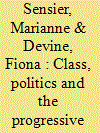| Srl | Item |
| 1 |
ID:
152551


|
|
|
|
|
| Summary/Abstract |
This article considers contemporary class inequalities and how they might shape a progressive politics in the UK. Drawing on findings from the BBC Class Survey, it outlines changes in the class structure, class mobility and class identities. It is argued that the class structure is increasingly polarised and fragmented, with a wealthy elite, a vulnerable precariat and fragmented middle and working classes in between. Declining upward social mobility is a source of anxiety for middle-class and working-class parents alike. Class identification, especially working-class identification, has weakened over time, although class snobbery is far from dead. Class has changed and the class basis of politics is changing now too. A progressive politics is possible if the political parties of the centre-left appeal to the majority of the electorate rather than one class, acknowledge common concerns and worries and appeal to shared hopes and dreams that straddle class boundaries.
|
|
|
|
|
|
|
|
|
|
|
|
|
|
|
|
| 2 |
ID:
158421


|
|
|
|
|
| Summary/Abstract |
This article investigates the changing role of youth in Nepali Maoism following their transformation from a guerrilla army to a parliamentary party after 2006. Drawing on 1 year of ethnographic fieldwork, I trace how the category of youth gained renewed relevance after the war and allowed the Maoist movement to sidestep complicated issues of class in the urban fabric. Building on a Gramscian framework of subaltern politics and Harvey’s ‘dialectical utopianism’, I argue that youth in the post-revolutionary context have become aligned with the political project of building ‘New Nepal’ and that this allows youth, as both a category and a subject position, to emerge as tools for utopian communist politics. Through an analysis of a divided class landscape in Kathmandu, the article documents the new and difficult alignments between Maoist ideals and positions of youth in the city with lasting outcomes for the party’s revolutionary project.
|
|
|
|
|
|
|
|
|
|
|
|
|
|
|
|
| 3 |
ID:
160097


|
|
|
|
|
| Summary/Abstract |
This article investigates the changing role of youth in Nepali Maoism following their transformation from a guerrilla army to a parliamentary party after 2006. Drawing on 1 year of ethnographic fieldwork, I trace how the category of youth gained renewed relevance after the war and allowed the Maoist movement to sidestep complicated issues of class in the urban fabric. Building on a Gramscian framework of subaltern politics and Harvey’s ‘dialectical utopianism’, I argue that youth in the post-revolutionary context have become aligned with the political project of building ‘New Nepal’ and that this allows youth, as both a category and a subject position, to emerge as tools for utopian communist politics. Through an analysis of a divided class landscape in Kathmandu, the article documents the new and difficult alignments between Maoist ideals and positions of youth in the city with lasting outcomes for the party’s revolutionary project.
|
|
|
|
|
|
|
|
|
|
|
|
|
|
|
|